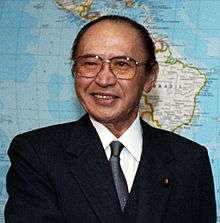Michio Watanabe
| Michio Watanabe | |
|---|---|
| 渡辺 美智雄 | |
 Watanabe in 1993 | |
| Deputy Prime Minister | |
|
In office 5 November 1991 – 7 April 1993 | |
| Prime Minister | Kiichi Miyazawa |
| Preceded by | Kiichi Miyazawa |
| Succeeded by | Masaharu Gotoda |
| Minister for Foreign Affairs | |
|
In office 5 November 1991 – 7 April 1993 | |
| Prime Minister | Kiichi Miyazawa |
| Preceded by | Taro Nakayama |
| Succeeded by | Kabun Mutō |
| Minister of International Trade and Industry | |
|
In office 28 December 1985 – 22 July 1987 | |
| Prime Minister | Yasuhiro Nakasone |
| Preceded by | Keijiro Murata |
| Succeeded by | Hajime Tamura |
| Minister of Finance | |
|
In office 17 July 1980 – 17 November 1982 | |
| Prime Minister | Zenkō Suzuki |
| Preceded by | Noboru Takeshita |
| Succeeded by | Noboru Takeshita |
| Minister of Agriculture, Forestry and Fisheries | |
|
In office 7 December 1978 – 9 November 1979 | |
| Prime Minister | Masayoshi Ōhira |
| Preceded by | Ichiro Nakagawa |
| Succeeded by | Kabun Mutō |
| Minister of Health and Welfare | |
|
In office 24 December 1976 – 28 November 1977 | |
| Prime Minister | Takeo Fukuda |
| Preceded by | Takashi Hayakawa |
| Succeeded by | Tatsuo Ozawa |
| Personal details | |
| Born |
July 28, 1923 Ōtawara, Tochigi, Japan |
| Died |
September 15, 1995 (aged 72) Tokyo, Japan |
| Cause of death | Heart failure |
| Political party | Liberal Democratic Party |
| Spouse(s) | Sumiko Watanabe |
| Children |
Yoshimi Watanabe Michiaki Watanabe |
| Alma mater | Tokyo College of Commerce |
Michio Watanabe (渡辺 美智雄 Watanabe Michio, July 28, 1923 – September 15, 1995) was a Japanese political figure. He was born in Ōtawara, Tochigi and graduated from the Tokyo College of Commerce (now Hitotsubashi University) in 1942.[1] He worked as a reporter for the Yomiuri Shimbun, a certified tax accountant, and a member of Tochigi prefectural assembly before serving as a member of House of Representatives of Japan.
He was a member of Seiran-kai, a conservative faction within the LDP, from 1973 to 1976.[2] He later served as Health Minister from 1976 to 1977, Minister of Agriculture and Forestry from 1978 to 1979, and Minister of Finance from 1980 to 1982. He served as Deputy Prime Minister of Japan and Minister for Foreign Affairs from 1991 to 1993, and made unsuccessful bids for the presidency of the Liberal Democratic Party in 1991 and 1993.[1] He gained some international notoriety for stating in 1988 that African Americans had "no qualms about not paying their bills," and for stating in 1995 that the Japanese annexation of Korea was done with Korea's consent.[1]
Although he was ideologically opposed to communist China and favored Taiwan, he made efforts as Deputy Prime Minister to facilitate diplomacy between China and Japan in the wake of the Tiananmen Square incident, developing a relationship with the Chinese ambassador to Japan. He visited China for a meeting with its foreign minister in 1992, and the dialogue during this visit paved the way for Emperor Akihito to visit China later that year.[2]
He was hospitalized for gallstones in 1992, but rumors of a more serious illness spread shortly thereafter, and he resigned for health reasons in 1993. After leading a Japanese delegation to North Korea in March 1995, he died from heart failure in September 1995.[1] His eldest son, Yoshimi Watanabe, inherited his Diet seat and serves as the leader of Your Party. His grandson Michitaro Watanabe (the eldest son of his second son Michiaki Watanabe) is a member of the House of Councillors.[3]
References
- 1 2 3 4 Pollack, Andrew (16 September 1995). "Michio Watanabe, 72, of Japan; Powerful Minister Despite Gaffes". New York Times. Retrieved 24 March 2014.
- 1 2 "渡辺喜美氏、日中関係悪化「オヤジは非常に悔しいと…」". Nihon Keizai Shimbun. 23 March 2014. Retrieved 24 March 2014.
- ↑ "渡辺喜美家系図". Retrieved 24 March 2014.
| Political offices | ||
|---|---|---|
| Preceded by Takashi Harakawa |
Minister of Health and Welfare 1976–1977 |
Succeeded by Tatsuo Ozawa |
| Preceded by Ichiro Nakagawa |
Minister of Agriculture, Forestry and Fisheries 1978–1979 |
Succeeded by Kabun Mutō |
| Preceded by Noboru Takeshita |
Minister for Finance of Japan 1980–1982 |
Succeeded by Noboru Takeshita |
| Preceded by Keijirō Murata |
Minister of International Trade and Industry 1985–1986 |
Succeeded by Hajime Tamura |
| Preceded by Taro Nakayama |
Minister for Foreign Affairs of Japan 1991–1993 |
Succeeded by Kabun Mutō |
| Preceded by Kiichi Miyazawa |
Deputy Prime Minister of Japan 1991–1993 |
Succeeded by Masaharu Gotōda |
| House of Representatives of Japan | ||
| Preceded by Yoshimasa Sakamura |
Chair, Committee on Cabinet of the House of Representatives 1976 |
Succeeded by Keijiro Shoji |
| Party political offices | ||
| Preceded by Masayoshi Ito |
Chair, Policy Research Council of the Liberal Democratic Party 1987–1989 |
Succeeded by Keijiro Murata |
| Preceded by Yoshio Sakurauchi |
Head of Seisaku Kagaku Kenkyūkai 1990–1995 |
Succeeded by Yasuhiro Nakasone Interim |
| Wikimedia Commons has media related to Michio Watanabe. |